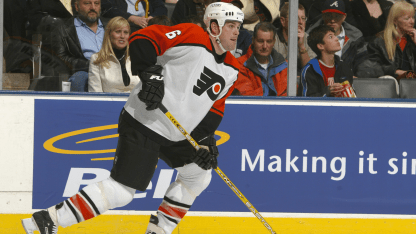How many days off is too many in the middle of a hockey season, you might ask? Well I can safely say that a nine-day break is too long But most likely necessary as well. As you move past the midpoint of a season -- the Flyers are, in fact, already at the 50-game mark -- nagging injuries and fatigue begin to become part of the equation more so than at any other time during the course of the season.
Therien's Take: Too Much of a Good Thing?

By
Chris Therien @ctherien6 / philadelphiaflyers.com
You've still got a long way to go before the postseason, yet you've already been through a physical and mental grind. The good news: Every other team and player is in the same boat.
How welcomed a schedule hiatus is will also depend on how your team is playing when you get on the break. The Flyers were playing outstanding hockey and collecting a lot of points prior to the All-Star break and bye week. With this much time off, you rarely can simply just pick up where you left off. Rather, it's almost starting a new mini-season.
Every team goes through this, so there are no excuses. Even so, it can wear on you a little bit when you get back because you were on such a roll beforehand and you can't just flip a switch. That's where mental toughness and leadership come in. The task is to get everyone quickly back on the same page, re-establish the things you were doing so well before the break, and then peak at the right time (i.e., the playoffs).
On the flip side, when a team that has struggled mightily gets to its nine-day or 10-day break, they look at it like a reprieve and a time to regroup and get out of their own way. When they come back, the challenge is to not feel like you're already just playing out the string. There's too much season left for that.
I am simply not a fan of the current NHL schedule. There are too many compacted stretches of games. Back-to-backs are no big deal. As a matter of fact, when I played, I often felt better and played better in the second game. It's when you get into 3-in-4, 4-in-6, 5-in-8 situations over and over ahead -- like the Flyers' 16-game slate back in November, which they came through in stellar fashion -- that add up and wear a team down.
A big part of the reason why the rest of the schedule is overly compacted is that the All-Star Break/ bye week combination is just as bad for a different reason. It's just too many days away from the rink.
I think it would be more sensible to have shorter, but more frequent mini-breaks. If you could somehow limit it to about 24 total days of interpersed breaks, it would be preferable from a team standpoint. For one thing, when the game schedule gets too compacted, practice opportunities become scarce. For another, by rule, teams are not allowed to practice during the mandatory hiatuses. That's great over the Christmas holidays, but starts to get excessive over the bye week.
You might be surprised at how quickly players decondition during a hiatus. When they finally get back to the rink, they lose their wind much faster and their skating legs and passing timing are off. It can about half a period to a full 20 minutes to start feeling normal again.
I have been on teams that have had very long breaks. In my rookie year with the Flyers, we had nine days off twice between playoff series because we beat Buffalo in five games and then swept the New York Rangers and had to wait for our next opponent, while other series went to six or seven games with an off-day between each game.
Two years later, it happened again. We beat Pittsburgh in five games in the first round, Buffalo in five games in the second and the Rangers in five games in the Eastern Conference Final and had to wait awhile for the next round to start. To this day, I think part of why we were so flat early in Game 1 of the 1995 Eastern Conference Final against New Jersey and the first period of Game 1 of the 1997 Stanley Cup Final against Detroit was that we'd been off a little too long and they had much shorter waits. It's not why we lost those two games and those two series, but it played into tough starts to the games. You get yourself in a jam if you're not ready to play from the outset.
I also remember some of those Olympic breaks during my NHL career. The guys who went to play in the Olympics for their national teams would often been worn down by the time they got back to their NHL teams. Meanwhile, many ofthe guys would be a bit rusty at first when the team reconvened two weeks later. That's definitely been one of the big hurdles to clear in years when the NHL participated in the Winter Olympics.
On Friday night, at least, the Flyers and Penguins will be on a level playing field. Both team's last played on Jan. 21: a 3-0 Flyers win over the Penguins at the Wells Fargo Center. Both teams had identical hiatuses after that game. Both only had one opportunity to practice ahead of the game.
The Flyers will then return home from western Pennsylvania right after the game and host the Colorado Avalanche at the Wells Fargo Center on Saturday night. This will be an uncommon scenario in that the road team will actually have been in the host city ahead of the home team, with a full practice and a regular night of sleep in that city. With the Avalanche also exiting their bye week, it afforded them the opportunity to approach Saturday's game in the same fashion as a club would for an opening night game on the road.
I'm not sure, however, if the "fatigue factor" (the Flyers being on the second half of a back-to-back while the opponent is rested) in this case will outweigh the "rustiness factor." The Flyers will already have had a game to recover their game legs and timing, while the Avalanche will have had only had 1-2 practices since playing their last game on Jan. 20.
We'll see how it unfolds over the weekend. With the Eastern Conference so tight and the Flyers on the wrong side of the playoff cutoff line, these are four crucial points at stake on Friday and Saturday nights.


















